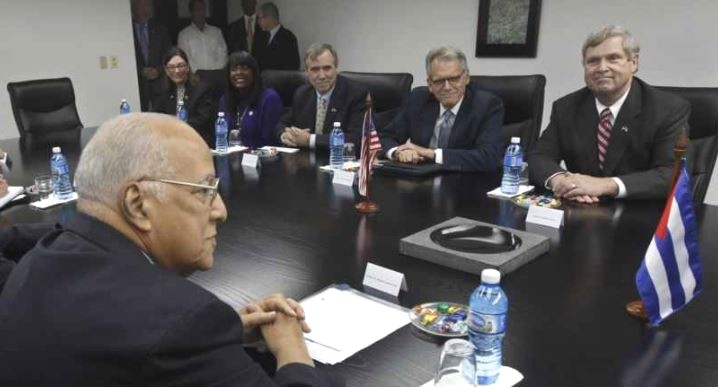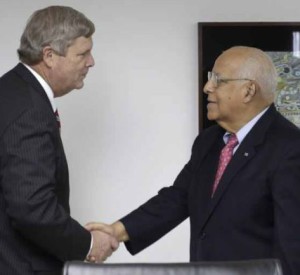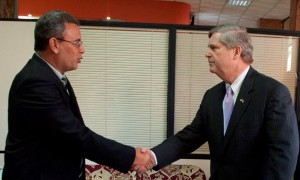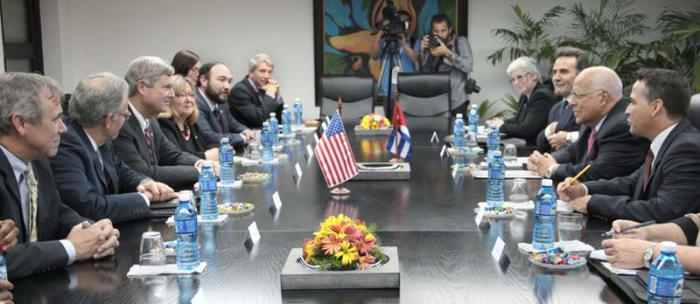
U.S. agriculture secretary is in Havana for talks
Thomas Vilsack, the U.S. Secretary of Agriculture, arrived in Havana on Wednesday (Nov. 11) for talks with Ricardo Cabrisas Ruiz, vice president of the Cuban Council of Ministers, the daily Granma reported on Thursday.
The meeting dealt with “Cuba’s foreign economic relations, the interests of the U.S. agricultural sector and the obstacles to trade between the two countries, derived from the application of the [economic] blockade” by the U.S. against Cuba, Granma stated.
Vilsack is the third member of the Obama cabinet to travel to Cuba, having been preceded by Secretary of State John Kerry, who went there in August, and Commerce Secretary Penny Pritzker who paid a visit in October. Other high-ranking U.S. government officials have traveled to the island since.

Vilsack is accompanied by Senator Jeff Merkley (D-Ore.), Representatives Terri Sewell (D-Ala.), Kurt Schrader (D-Ore.) and Suzan DelBene (D-Wash.) and other Agriculture Department officials.
Cuba was represented at the table by Cabrisas, Gustavo Machín Gómez, deputy director of the U.S. desk at the Foreign Ministry, and other officials of the ministries of Foreign Relations, Agriculture, and Foreign Trade & Investment.
On Thursday, Vilsack met with his Cuban counterpart, Rustavo Rodríguez Rollero. Details of their dialogue were not immediately available to the press.
In a statement released Wednesday, Vilsack said that “this trip will be an opportunity to support the Administration’s commitment to normalizing relations and empowering the Cuban people through bilateral agricultural engagement.”
“Food and agricultural goods are the dominant U.S. exports to Cuba and agriculture can serve as a bridge to foster cooperation, understanding and the exchange of ideas. Expanding markets for American agriculture has been a priority for this Administration, and relationships like the one we aim to build with Cuba are crucial to continuing the momentum we have seen over the past six years.”

Total U.S. exports to the island totaled $390 million in 2014 and $119 million in the first half of this year. Since 2001, Cuba has been allowed to buy food from the U.S., but only for cash in advance. No credit is allowed by the rules of the embargo and transactions cannot be made in U.S. dollars or through U.S. banks.
Congresswoman Sewell described the agro delegation’s trip as “historic.” The group will return to Washington on Saturday (Nov. 14), after touring port facilities, markets and cooperatives.
“I look forward to meeting with members of Cuba’s Ministry of Agriculture and discussing ways to further expand trade with Cuba,” she wrote in a statement before leaving for Cuba.
“Alabama exported approximately $32.8 million in food products to Cuba in 2014 […] With renewed U.S. diplomatic relations in Havana, my hope is that Alabama will derive huge economic benefits that have been fostered by existing trade relationships with Cuba.”

Last month, the governors of nine U.S. states asked Congress to end the trade embargo.
“Ending the embargo will create jobs here at home, especially in rural America, and will create new opportunities for American agriculture,” the governors’ letter said. “Expanding trade with Cuba will strengthen our nation’s agriculture sector by opening a market of 11 million people just 90 miles from our shores.”
[For an article on how trade with Cuba can benefit the state of Oregon, click here.]
In a speech last January launching the U.S. Agriculture Coalition for Cuba, Vilsack said that the Obama administration is “removing technical barriers between U.S. and Cuban companies and creating a more efficient, less burdensome opportunity for Cuba to buy U.S. agricultural products.
“These policy changes will help make our products far more price competitive, which will expand choices for Cuban shoppers at the grocery store and create a new customer base for America’s farmers and ranchers.
“Cuba imports about 80 percent of its food, which means that the economic potential for our producers is significant.”
[Photo at top of Ricardo Cabrisas seated across the table from (from right to left) Tom Vilsack; chargé d’affaires Jeffrey DeLaurentis; Jeff Merkley, and Terri Sewell.]

